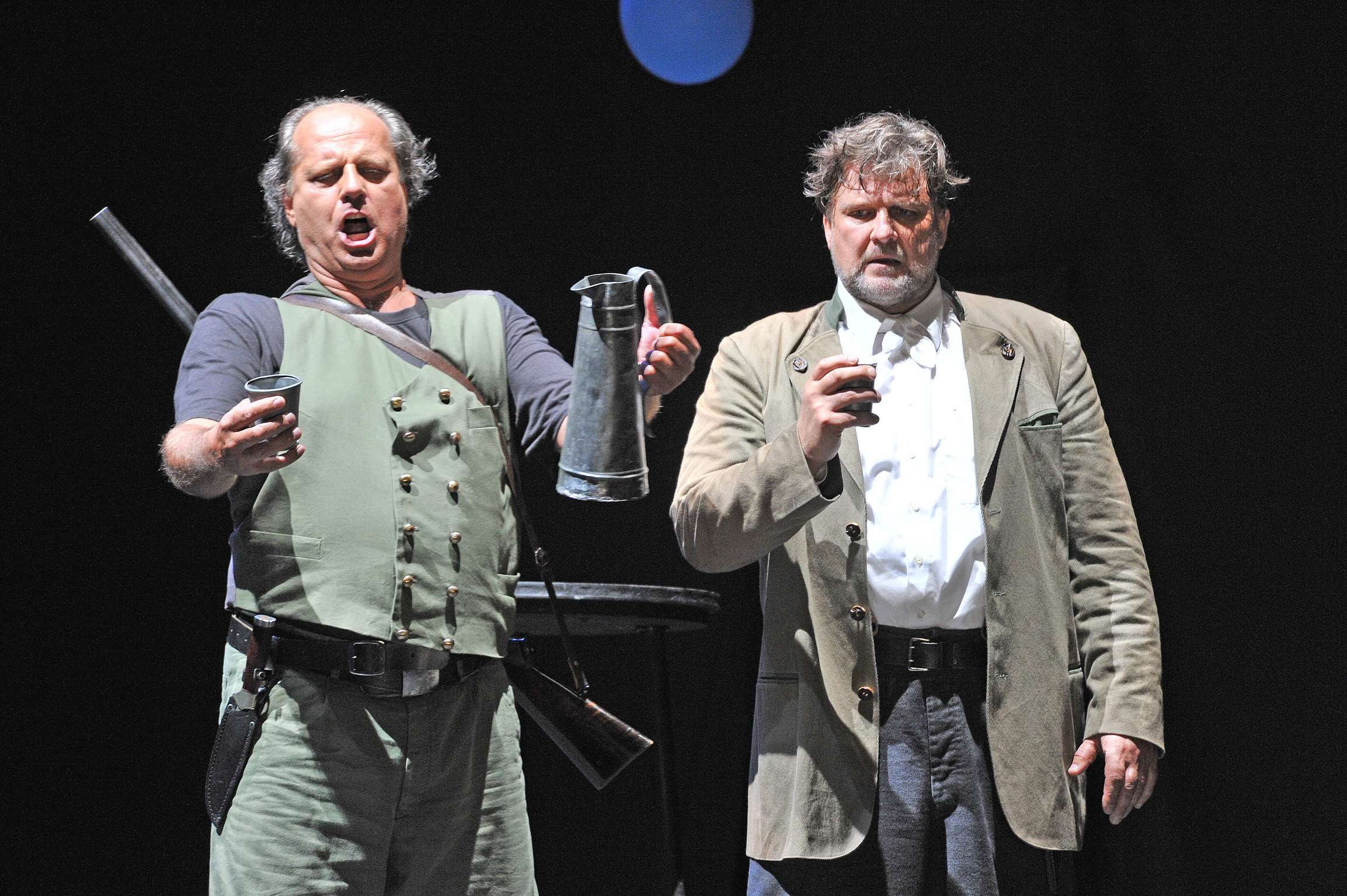|
Back
Supernatural Becomes a Child Tale Barcelona
Gran Teatre del Liceu
05/12/2011 - & May 15, 17, 18, 20, 21, 23, 24, 27, 29, 30, 2011
Carl Maria von Weber: Der Freischütz
Lauri Vassar (Ottokar), Rolf Haunstein (Kuno), Petra-Maria Schnitzer (Agathe), Ofèlia Sala (Ännchen), Albert Dohmen (Kaspar), Christopher Ventris (Max), Matti Salminen (A Hermit), Manel Esteve Madrid (Killian), Maria Such, Marta Polo, Àngels Padró, Min A. Baek (Four Bridesmaids), Alex Brendemühl (Zamiel), Anna Baldomà (viola soloist)
Orchestra and Chorus of the Gran Teatre del Liceu, José Luis Basso (Chorus Master), Anna Baldomà (viola soloist), Michael Boder (conductor)
Hamburgische Staatsoper Production, Peter Konwitschny (direction), Gabriele Koerbl (Set and Costume Designer), Hans Toelstede (Lighting Designer), Bettina Bartz (Dramaturgy), Petra Müller, Eleonora Herder (Direction Assistants), Alicia Fuster (Set Assistant), Bernd Grube (Lighting Assistant), Armería Alberdi (Firearms)

A. Domen & C. Ventris (© A. Bofill)
Der Freischütz is considered the first important German Romantic opera. While elements of national identity are present, the plot is based on a German legend, and many of its tunes are inspired by German folk music. A pinch of supernatural is also required, in this case the famous Wolf’s Glen scene, and the dark hunter, Zamiel.
With all these ingredients in Weber’s opera one should find a dark, almost Gothic presentation of these elements but it is not the case in this production. Peter Konwitschny takes all the ingredients and presents them to the audience as a child tale told by a child.
This means that all the elements are very abstract and simple. We don’t see the forest, we only get green curtains. The house of Agathe only consists of a table, four chairs, and a wall clock. All is shown in its minimal expression, as in a child drawing where the details are overlooked. All scene changes are made at plain view, thus offering little space for surprises.
It seems that all the details are left for the spoken parts and the evil. Der Freischütz is a traditional singspiel, so musical numbers alternate with spoken parts. This production has almost all the original spoken parts, a little hard for a non German audience. The dark hunter, Zamiel, played by the Spanish-German actor Alex Brendemühl, expresses himself in Catalan in this occasion. It creates a perverse effect: is the devil Catalan? Zamiel also appears in various scenes wearing several disguises showing all the faces of evil. Some in the audience booed Brendemühl after the recitative before the hunters' chorus.
The hermit, seated in the first row of the parterre, watches over Agathe. He is a mere spectator, stands up on several occasions and intervenes silently from the parterre. Only at the very end, when he prevents Agathe’s death in the third act, does he join the stage. Matti Salminen sang the hermit with a beautiful, still fresh bass voice. His ovation at the end was well deserved.
The especially poignant Wolf’s Glen scene, at the end of the second act, is almost treated like a cartoon with all the childish elements and the chorus, at the end, moving like walking dead. This scene was not thrilling at all but it should have been as this is the moment when Zamiel gets Max, the gamekeeper, under his control.
Christopher Ventris, as Max, steps in for an ailing Peter Seiffert. He deserved the applause for “Durch die Wälde (Through woods and fields)”. He seemed more comfortable as Parsifal, the role he sang previously at Liceu this season.
Kaspar, looked like a normal person, not the twisted mind one can expect. Albert Dohmen, as Kaspar, was impressive in his spoken parts. He was able to declaim all that words with a very deep voice. His singing was excellent, with a very big voice and a round low register.
Petra-Maria Schnitzer, as Agathe, was not able to take advantage of the famous “Leise, leise” aria in the second act. Her low register was almost inaudible and the top was a little erratic.
Ofèlia Sala overplayed Ännchen, following the director instructions, so the role was closer to Despina from Così fan tutte. This role without demanding high notes is almost entirely written in the middle register. Ofèlia Sala is adequate in the part but the projection of her voice is a little short.
Manel Esteve Madrid, as Kilian, Rolf Haunstein, as Kuno, and Lauri Vasar were all great at their parts. Anna Baldomà, the viola soloist, played on stage and also took part in the scene of the third act, “Einst träumte meiner sel'gen Base (My deceased cousin had a dream).”
The chorus, as always, sang wonderfully, especially at the end of the finale “Schaut, o schaut (See, oh see, he shoots his bride).”
The orchestra under the baton of Michael Boder sounded without cohesion at the beginning but redeemed themselves in the end and enhanced their playing. The ovation was deserved/
The Liceu audience greeted the cast with fairly cold applause. No one from the production team showed up at curtain call.
Lola Vicente
|